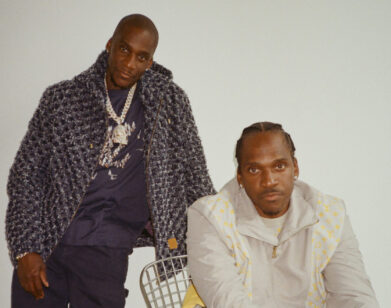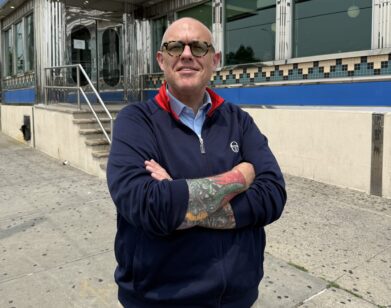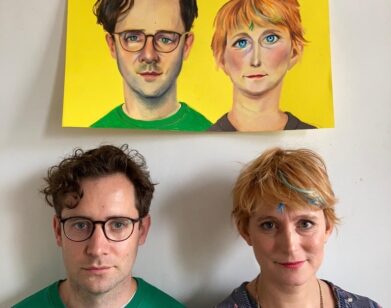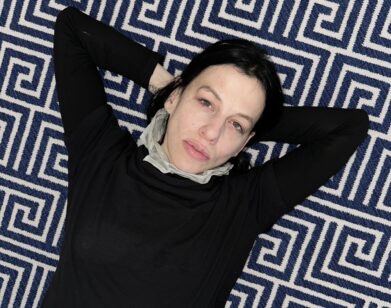NYC
MIKE Is Taking His Time and Living in the Moment
MIKE, the 24-year-old critically acclaimed godfather of New York City’s current underground rap scene, released his eighth album, Beware of the Monkey, on December 21st. It’s a triumph of a project; a meditation on loss and grief, a cathartic exploration of success—financial and spiritual—and a celebration of the blessing of family, friends, and simply being alive. I visited MIKE at his Crown Heights apartment mere days before it dropped, and we discussed the album, its looming release, and the creative decisions that went into making it. But, as soon as I walked in the door, I quickly realized the album, and how it will be received, was not MIKE’s most immediate concern. Instead, it was how to get his new dog, Mezcal, to stop defecating all over his walls. “It’s definitely a big change to my everyday lifestyle,” MIKE noted, laughing. “Usually, I wake up and stay in bed for four hours or go into the studio and smoke. But now, I wake up to the sound of her crying and have to go calm her down. Whenever I hear something that kind of sounds like a cry, I jump up from my bed and just run into the living room.” While this may seem like an atypical concern for someone on the brink of superstardom, it couldn’t be any more authentically MIKE. There’s a levity in his demeanor, a general air of humility and sensitivity, and a commitment to stay present and grounded in the moment.—JACKSON WALD
———
JACKSON WALD: Your last album, Disco!, came out in July 2021. This has been the longest gap for you between album drops—why have you taken such a long break?
MIKE: Well, for one, I was pretty eager to release it in the summertime, but I was also doing hella shit. I was coming off multiple long-ass tours, and it was kind of a moment of realization where I was like, “Oh, I don’t actually have to release a project this summer. I don’t have to force myself to do this shit.” But it was cool that I got to round in on a lot of different emotions that I usually wouldn’t be able to put into a project in that usual six months-to-a-year span.
WALD: Nowadays, music is often regarded as content that needs to be pushed out quickly for an artist to stay relevant. How do you avoid that pressure and create on your own terms?
MIKE: I’m so blessed to be surrounded by so many artists and people that I generally just have respect for, whether it comes to their work or just who they are. When I show those people my work, that’s how I get my biggest source of validation. Certain people may seek validation from Instagram but usually, if enough people I trust tell me something is good, then I’ll just be like, “All right, cool. We did it,” and it’ll make me even more excited to eventually share it with the world. I feel like also, in the time where music is seen as content, you also do got to train yourself to not be on the same bandwagon as everybody else. Because sometimes, you can try and do that shit and people will just be like “Alright?” [Laughs].
WALD: And in rap music especially, you go through these trends and people will be popular for their shtick, kind of like that SoundCloud rap era back in 2016 where everyone and their mom knew Lil Pump. But now that the culture has moved on, he’s not popular anymore.
MIKE: I feel like what makes it count is what type of person you are. Because even all the SoundCloud rappers from that era, the people that actually stood for something or stood with real character, were able to progress—and progress not even financially, but also in what they did for the whole movement and for the culture. It’s just about people’s time. Eventually, people will understand if you actually had a message. Lil Pump obviously didn’t have shit to say.
WALD: What have you been listening to lately? What’s been inspiring you?
MIKE: Recently, I went to Detroit. I played this show with Danny Brown. That shit was super tough. There was this group playing that my friend, Khalila, had put me onto called HiTech. It’s basically Detroit Tech mixed with modern rap. That shit blew my mind. I was watching them and hairs were standing up on my arms. I’ve actually been bumping a lot of Fela Kuti as well. Specifically, one song called “Power Show.” Fela Kuti has been helping me bring something that feels close to my traditional culture, but also, it’s still cool enough to exist right now.
WALD: Can you expand on that? That sounds really fascinating.
MIKE: I’m somebody who really loves performance. So, with Fela Kuti, just listening to his music has been inspiring me a lot. Knowing that [the music] came from a Nigerian man, that it came out of rebellion and being against authorities and seeing how he moves and talks about shit. Also, hearing his music and trying to relate it to the shit that I’m going through—and what he was going through was really crazy—but we’re in different times where those struggles don’t look the same. So it’s cool to feel that intensity and then express it with what’s going on with me today or what other people might be dealing with today. I’ll be in the shower screaming his lyrics.
WALD: Can you tell me a bit about “Stop Worry,” and what it meant to you to get Sister Nancy on a track?
MIKE: It was a very exciting moment because Sister Nancy’s always been a super big influence on me. I used to watch so much Sister Nancy. Well, she really only has six, seven clips of her performing live. But I would watch the shit out of all the videos, just keep watching them over and over. And that one project, One, Two, that has “Bam Bam,” “Ain’t No Stopping Nancy Now,” and “Coward of the Country,” on it. So many of those tracks just felt so… I feel like when people be listening to hip-hop for the raw, the “ugh, this feels real” … it can’t realer than that album. There are so many lyrics from that album that show you the toughness that everybody needs, especially for a woman in a place like Jamaica. Something about it just drew me so close to her.
WALD: I watched the music video for the song and started reading through the comments. I saw that you liked a few comments talking about how your music has helped them through their struggles and grief. What was your reaction to reading that?
MIKE: A lot of the things I be talking about be happening at such moments where I could be feeling very alone or moments where I was personally dealing with some shit for a long time and the world didn’t know. And if [my music] is able to put happiness in somebody’s life or keep somebody’s head up, I’m doing the right thing. And then it also made me realize, people sometimes just need a sense of hope. Or a sense of faith. And not even necessarily me providing the sense of hope, but just me being able to be like, “Yeah, I’m going through this shit as well.” I think a lot of people appreciate that. And that shit means the most to me. It’s a very good feeling to know that people feel safe.
WALD: There’s a line on the album where you say that you dug into the dirt and you found the pearl. When you’re writing your music and performing, how do you capture those emotions at the same time?
MIKE: I feel like this year especially, I’ve figured out the words to describe that. I think that’s such a big part of just why I make music, and why my music sounds the way it does. I was talking about this recently. For example, on the last song, where I was like, “The problem is you still win and gotta feel the guilt” … there are such things as a victory that comes with guilt. Or the fact that I have to lose something, even though it’s a good thing for me to lose. I just be wanting to show the fact that the emotion doesn’t end on either happy or sad. It’s more complex. I be seeing people like, “Oh, he sounds happy.” Or they’re like, “Yo, he seems like he was going through it on this one.” But sometimes it’s like, “Yo, that’s not even the full feeling.” I enjoy the challenge of trying to express the full depth of my feelings.
WALD: You were 17 years old when your first album came out. You’re 24 now, and eight albums in. Is that easier to do now?
MIKE: For sure. I wouldn’t even say it becomes easier because there’s certain things that come with age that makes it even harder to express these things. I’m not going to lie. Pride and ego, the idea of what people expect you to be, what it means to be a man at this age in society. But my purpose when it comes to being a writer is to also analyze these expectations, and to analyze what’s going on as I’m growing up.
WALD: There’s also a number of lyrics in the album about money, and more specifically how you stay grounded and not let money or abundance influence you.
MIKE: The year that I was working on the project, I was having a lot of different opportunities come through. It’s the most [financially] stable I’ve ever been. But emotionally, I wouldn’t say so. It’s kind of like the punching bag, you keep punching it and punching it and you’re getting better at fighting because you think it’s going to bring you some type of value. But at the end of the day, you’re just punching the punching bag because you already know how to do that, and there’s this whole other side of you that needs maintenance. And I feel like when it comes to hustling, when it comes to making money, that’s something that has been ingrained in me since a young kid. And now, I keep trying to press the button, the hustle ringer, and it’s not doing nothing for me no more. I have to reflect on the things inside of me that I’m dealing with. How come I feel the victory but also feel guilty every time that I feel the victory? Or how come I premeditate sadness at the best moments? A lot about it is wanting to be in the moment. I feel like Beware of the Monkey is a fight to be in the moment, to be present.
WALD: When you’re listening to music and looking for a sample, what do you seek out? How do you know when something sounds right?
MIKE: Certain music just has a certain energy to it, or swag. When I first heard [the sample in] “nuthin i can do is wrng,” I was like, “Bro, this dude sounds like he could have been next to Michael Jackson. This feels so purposeful, intentional, and warm.” It felt like somebody put their heart into it, and probably didn’t even feel confident for it to be a hit. But they were just like, “Yo, I’m going to do what makes me feel good.” And you could hear that.
WALD: DJ BlackPower, your alias, is labeled as an executive producer on the new album. Can you elaborate on the separation between you, MIKE, and DJ BlackPower?
MIKE: I love the idea of building worlds and I feel like splitting those things up, it’s something that could help me build more worlds into existence. There are just certain vibes that I am trying to hit on with the particular projects. So, incorporating those different worlds always just comes with just a new drip. And that shit just always feels good.
WALD: Your albums are released always either on the summer solstice or the winter solstice. Why?
MIKE: It started when I was super young before I started even releasing music. I always fucked with that one Shakespeare play, A Midsummer Night’s Dream. When I was younger I used to have a super vivid imagination, and so I read Shakespeare and I was like, “Yo, this shit just sounds crazy.” And then, I always was thinking about the summer solstice, how it’s the longest day and the shortest night. Eventually, I had made the idea, “Yo, let me try and incorporate this into music.” And in WINTER NEW YORK [Mike’s 2015 mixtape] which came out on 12/21, the winter solstice, the first few tracks are supposed to be the more uppity, more vibrant tracks, then the longer side of the project is supposed to be the night, the darker tracks. And then the [album] after that, Longest Day, Shortest Night, I try to do the opposite. So most of the tracks [in the beginning] are more lit or hard-banging tracks, then the few at the end are sad, more dull tracks.
WALD: Since you were a teenager, you’ve always put on for, and been one of the faces of, New York’s underground rap scene. What are your thoughts on it now?
MIKE: Right now, it’s really fire. It’s fire because I think what it made me realize is that whether you have a binoculars on or not, you’re still growing. There’s a lot of people that I’ve known in the city that haven’t had that magnifying glass over them and are literally some of the best artists that I’ve heard. But then I be knowing that sometimes, people don’t be ready to hear or even take in what’s new. People are never like, “Oh, what about the New York scene?” People talk about the New York scene and nobody knows what the fuck a New York scene is because New York is big as fuck. It has different types of music. There’s people doing so many different type of shit. That’s also something else that helps me keep my head right here because I’m like, “Bro, I’m not the only rapper in New York. There’s so many other people doing this shit.” And there’s people that don’t got no chains, that don’t even put they shit on SoundCloud, that I’m like, “Bro, you’re the best rapper. You’re the best producer. Your mind with music, you’re the guy.”
WALD: In the ’90s, New York rap was second-to-none, so you have to live up to a certain standard.
MIKE: It’s crazy because you start to realize that, fuck, all those people had kids, they’re all our age. Some of them might be working in a store, but also one of them might actually be a rapper or be a musician or a DJ. And there’s plenty of people from that time that were so talented and didn’t get the billboard shit or didn’t have their face everywhere, but are still here today to be like, “Yo, I was a part of that.” You can meet them in real life. When I think about my future self and how I exist in all this shit, I only want to be able to still live where I live, shake people’s hands and carry on going about my way. I never want to be a fucking… What’s the word I’m looking for? A commodity to people.









